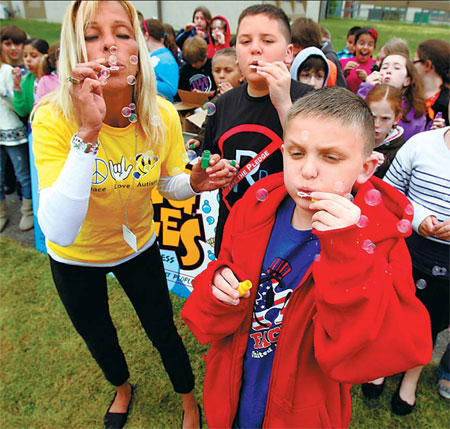Big increase in childhood autism
|
|
About one in 88 in United States now diagnosed, says study
Brandon was 18 months old when he started walking on his toes and flopping his hands. He had not started talking yet. When he flipped a toy car over and kept turning its wheels instead of actually playing with it, his mother, Michele Montanez, realized that something was wrong.
Friends suggested she take Brandon for a medical evaluation and the doctors confirmed Michele's ultimate fear. Her son was diagnosed with autism, a developmental neurological disorder that causes reduced emotional response and other behavioral issues.
"Your heart sinks," is how Michele remembers the day she first learned about the diagnosis. "I think the first question that any parent wants to know is: Will my child ever speak to me? Will my child ever give me a hug, say I love you?"
A recent study published by the US Centers for Disease Control and Prevention reported an alarming increase in the prevalence of autism among children. About one in 88 children in the US are now diagnosed with autism, a 78 percent increase compared to 2002.
More children are now affected by autism-related disorders than by diabetes, cancer, AIDS, cerebral palsy and Down syndrome combined, according to the research group, Autism Speaks.
Scientists and doctors are still desperately searching for decisive answers to what causes the disorder. "We now have some preliminary evidence suggesting that age of the parents, low birth weight or prematurity may be possible risk factors," Vice-President of Scientific Affairs for Autism Speaks Andy Shih explains.
"Pesticides and other industrial chemicals may play a role as well," she said, adding that "autism in this country has truly reached epidemic proportions".
Brandon started extensive therapy sessions just a few weeks before his second birthday. His daily routine included a curriculum of speech therapy, occupational therapy, physical therapy and, as he got older, behavioral therapy. To his mother's great relief, he finally started to speak.
"Once he started talking, he really started talking," Michele remembers. Like most children on the autism spectrum, Brandon switched from not speaking at all to being hyper-verbal. He started to babble words he had picked up on TV or he imitated the sounds of penguins, his favorite animal.
As Brandon got older, he was slowly able to communicate and have short conversations. He is now nine years old and attends a special state-funded school for children and young adults on the broad spectrum of autistic disorders. Each class consists of eight children, one teacher and two assistants.
In addition to regular school subjects, such as math, reading and writing, the children here also learn life skills. They take cooking classes and they are taught how to clean an apartment or do laundry.
After years of behavioral therapy, Brandon has adapted well. He is now able to tell his mother what he did in school or who his friends are.
"We got lucky," Michele says, as not all autistic children are able to respond to social cues or show emotions.
"That's to me the more heartbreaking thing, to sit with your child and to love them with everything that you have and not to know if your child even knows that you love them," she says.
Michele said she hopes studies like the one released by the CDC will lead to more research and eventually to answers to what causes the disorder. She also believes that society needs to be aware of the increasingly larger group of children and young adults on the autism spectrum.
"We need to start integrating them into society. There's going to be a whole generation. It's less than a decade away," she says.
She is convinced that given the right support, some autistic adults could be integrated into the workforce and live independent lives.
Xinhua



















